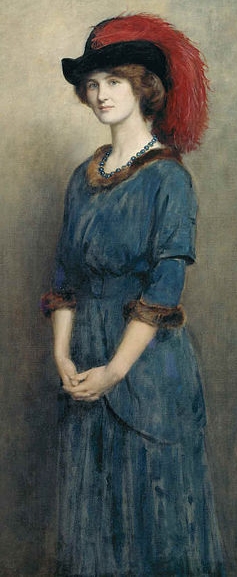Cheerfulness Breaks In: A Barsetshire War Survey (Barsetshire #9)
Book Details
| Title: | Cheerfulness Breaks In: A Barsetshire War Survey (Barsetshire #9) | ||||||||||
| Author: |
| ||||||||||
| Published: | 1940 | ||||||||||
| Publisher: | Hamish Hamilton Ltd. | ||||||||||
| Tags: | fiction, war, World War II, Barsetshire (England: Imaginary place), Family Saga | ||||||||||
| Description: | The Barsetshire families in the early days of WWII, and Lydia Merton and others watch the departure of loved ones to the front. [Suggest a different description.] |
||||||||||
| Downloads: | 244 | ||||||||||
| Pages: | 216  |
Author Bio for Thirkell, Angela Margaret

Thirkell began writing early in her life in Australia, chiefly through the need for money. An article appeared in the Cornhill Magazine in November 1921 and was the first of many articles and short stories, including work for Australian radio. On her return to England in 1929, this career continued with journalism, stories for children, and then novels. Her success as a novelist began with her second novel, High Rising (1933). She set most of her novels in Anthony Trollope's Barsetshire, his fictional English county developed in the six novels known as the Chronicles of Barsetshire. An alert reader of contemporary fiction, Thirkell also borrowed freely from such now-arcane titles as John Galsworthy's The Country House, from which, for example, she lifted the name 'Worsted' which she used for the village setting of her novel August Folly (1936). She also quoted frequently, and without attribution, from novels by Charles Dickens, William Thackeray, and Elizabeth Gaskell. Thirkell published a new novel every year, which she referred to in correspondence with her editor, Jamie Hamilton of Hamish Hamilton, as new wine in an old bottle. She professed horror at the idea that her circle of well educated and upper-middle-class friends might read her fiction: she expected them to prefer, as she did, such writers as Gibbon, Austen, Dickens, and Proust. She drew the epigraph to T 1951 from Proust: "Les gens du monde se représentent volontiers les livres comme une espèce de cube dont une face est enlevée, si bien que l'auteur se dépêche de 'faire entrer' dedans les personnes qu'il rencontre" ("Society people think that books are a sort of cube, one side of which the author opens the better to insert into it the people he meets.")
Her books of the 1930s in particular had a satiric exuberance, as in Pomfret Towers, which sends up village ways, aristocratic folly and middle-class aspirations. Three Houses (1931, Oxford University Press; repeatedly reprinted) is a short childhood memoir which simultaneously displays Thirkell's precociously finished style, her lifelong melancholy, and her idolisation of her grandfather, Edward Burne-Jones. Trooper to the Southern Cross (1934; republished in 1939 as What Happened on the Boat) "is concerned with the experiences of a number of English and Australian passengers aboard a troop-ship, the Rudolstadt, on their way back to Australia immediately after World War I. It is particularly interesting for its depiction of the Australian 'digger'; his anti-authoritarianism, larrikinism, and, at the same time, his loyalty to those whom he respects."
In the 1940s, her work was coloured by the war and the war efforts. The home front figured particularly in Cheerfulness Breaks In (1940), showing how women saw their loved ones off to the front, and Northbridge Rectory, which showed how housewives coped with the annoyances of wartime life. These books include Marling Hall, Growing Up and The Headmistress, and provide a vibrant picture of the attitude, struggle, and resigned good cheer, of British women during the war. Even a book which did not deal exclusively with the war effort, Miss Bunting, addressed changes in society the war had wrought, as the title character, a governess, grows to middle age and wonders how to live out her life, and where her ambitions might take her as the world turns upside down. These books provide a time capsule of the age.
Later books in the 1950s became more romantic and less contemporary. Among these, The Old Bank House in particular shows Thirkell concerned with the rise of the merchant class, her own prejudices evident, but giving way to grudging respect for industriousness and goodhearted generosity. Later books are simpler romances. The romance The Duke's Daughter deals in a way more directly than some of her others with descendants of Trollope's Barsetshire characters. Her final book, Three Score and Ten, was left unfinished at her death, but was completed later by C. A. Lejeune.--Wikipedia.
Available Formats
No book directory. Upload has not been completed.This book is in the public domain in Canada, and is made available to you DRM-free. You may do whatever you like with this book, but mostly we hope you will read it.
Here at FadedPage and our companion site Distributed Proofreaders Canada, we pride ourselves on producing the best ebooks you can find. Please tell us about any errors you have found in this book, or in the information on this page about this book.